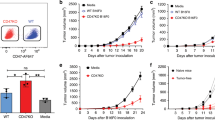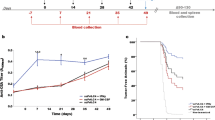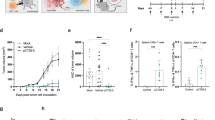Abstract
In order to induce specific antitumor immunity in mice, we attempted to immunize C57BL/6 mice with DNA vaccine encoding MUC1 polypeptide. When the mice immunized with MUC1 DNA were challenged with EL4-muc, MUC1-transfected syngeneic lymphoma cells, they completely rejected tumors. When DNA vaccine was given to the EL4-muc tumor-bearing mice, this vaccination was insufficient to suppress tumor growth in the mice. However, activated, but nonprimed dendritic cells (DCs) obtained from syngeneic mice and MUC1 DNA vaccine were given simultaneously to the same site of EL4-muc tumor-bearing mice, tumor growth was markedly suppressed accompanying prolongation of survival time. MUC1 antigen was detected on the DCs at the vaccination site and in regional nodes in the mice which received MUC1 DNA vaccine and DCs. These mice showed markedly enhanced cellular immune responses specific for MUC1 compared to those in mice vaccinated with MUC1 DNA alone. No significant difference in titers of antibodies to MUC1 between the two groups was observed. These results suggest that nonprimed DCs inoculated at the DNA vaccine site are essential for eliciting strong antitumor cellular immunity to suppress tumor growth efficiently in DNA-vaccinated mice. This animal model is useful for developing DNA vaccine for anti-cancer immunotherapy.
This is a preview of subscription content, access via your institution
Access options
Subscribe to this journal
Receive 12 print issues and online access
$259.00 per year
only $21.58 per issue
Buy this article
- Purchase on Springer Link
- Instant access to full article PDF
Prices may be subject to local taxes which are calculated during checkout







Similar content being viewed by others
References
Topalian SL, Muul LM, Solomon D et al. Expansion of human tumor infiltrating lymphocytes for use in immunotherapy trials J Immunol Methods 1987 102: 127–141
Rosenberg SA, Lotze MT, Muul LM et al. A progress report on the treatment of 157 patients with advanced cancer using lymphokine-activated killer cells and interleukin-2 or high-dose interleukin-2 alone N Engl J Med 1987 15: 889–897
Pardoll DM . Paracrine cytokine adjuvants in cancer immunotherapy Annu Rev Immunol 1995 13: 399–415
Buchler M, Friess H, Schultheiss KH et al. A randomized controlled trial of adjuvant immunotherapy (murine monoclonal antibody 494/32) in resectable pancreatic cancer Cancer 1991 68: 1507–1512
Damianov C, Patrashkov T, Tonchev T et al. BCG vaccine therapy for treatment of superficial bladder cancer Int Urol Nephrol 1989 21: 305–312
Clemens JD, Stanton BF . BCG prophylaxis against cancer: methodological evaluation of a continuing controversy J Chronic Dis 1984 37: 45–54
Vermorken JB, Claessen AM, van Tinteren H et al. Active specific immunotherapy for stage II and stage III human colon cancer: a randomised trial Lancet 1999 353: 345–350
Hoover HC, Hoover HC Jr, Brandhorst JS et al. Adjuvant active specific immunotherapy for human colorectal cancer: 6.5-year median follow-up of a phase II prospectively randomized trial J Clin Oncol 1993 11: 390–399
Rosenberg SA, Yang JC, Schwartzentruber DJ et al. Immunogenic and therapeutic evaluation of a synthetic peptide vaccine for the treatment of patients with metastatic melanoma Nat Med 1998 4: 321–327
Marchand M, Weynants P, Rankin E et al. Tumor regression responses in melanoma patients treated with a peptide encoded by gene MAGE-3 Int J Cancer 1995 63: 883–885
Donnelly JJ, Ulmer JB, Liu MA . DNA vaccine Life Sci 1997 60: 163–172
Maecker HT, Uematsu DT, DeKruyff RH et al. Cytotoxic T cell responses to DNA vaccination: dependence on antigen presentation via class II MHC J Immunol 1998 161: 6532–6536
Klimman DM, Sechler JMG, Conover J et al. Contribution of cells at the site of DNA vaccination to the generation of antigen-specific immunity and memory J Immunol 1998 160: 2388–2392
Iwasaki A, Barber BH . Induction by DNA immunization of a protective antitumor cytotoxic T lymphocyte response against a minimal-epitope–expressing tumor Cancer Immunol Immunother 1998 45: 273–279
Chen Y, Hu D, Eling DJ et al. DNA vaccine encoding full-length or truncated neu induce protective immunity against neu-expressing mammary tumors Cancer Res 1998 58: 1965–1971
Chen CH, Wang TL, Hung CF et al. Enhancement of DNA vaccine potency by linkage of antigen gene to an HSP70 gene Cancer Res 2000 60: 1035–1042
Graham RA, Burchell JM, Beverley P et al. Intramuscular immunisation with MUC1 cDNA can protect C57 mice challenged with MUC1-expressing syngeneic mouse tumour cells Int J Cancer 1996 65: 664–670
Mendirata SK, Thai G, Eslahi NK et al. Therapeutic tumor immunity induced by polyimmunization with melanoma antigens gp100 and TRP-2 Cancer Res 2001 61: 859–863
Seregni E, Botti C, Lombordo C et al. Pattern of mucin expression in normal and neoplastic lung tissues Anticancer Res 1996 16: 2209–2214
Ho SB, Shekels LL, Toribara NW et al. Mucin gene expression in normal, preneoplastic, and neoplastic human gastric epithelium Cancer Res 1995 55: 2681–2690
Ogata S, Uehara H, Chen A et al. Mucin gene expression in colonic tissues and cell lines Cancer Res 1992 52: 5971–5978
Lan ML, Hollingsworth MA, Metzgar RA . Polypeptide coreofa human pancreatic tumor antigen Cancer Res 1990 50: 2997–3001
Apostolopoulos V, Haurum JS, McKenzie IF . MUC1 peptide epitopes associated with five different H-2 class I molecules Eur J Immunol 1997 27: 2579–2587
Barnd DL, Lan M, Metzgar R et al. Specific, MHC-unrestricted recognition of tumor-associated mucins by human cytotoxic T cells Pro Natl Acad Sci USA 1989 86: 7159–7163
Itoh Y, Kajino K, Ogasawara K et al. Determination of the allele-specific antigen-binding site on I-Ak and I-Ab molecules Eur J Immunol 1996 26: 1314–1321
Leitner WW, Ying H, Driver DA et al. Enhancement of tumor-specific immune response with plasmid DNA replicon vectors Cancer Res 2000 60: 51–55
Burchell J, Gendler S, Taylor-Papadimitriou J et al. Development and characterization of breast cancer reactive monoclonal antibodies directed to the protein core of the human milk mucin Cancer Res 1987 47: 5476–5482
Finn OJ, Barnd DL, Kerr L et al. Specific recognition of human tumor antigens by non–MHC-restricted CTL Human Tumor Antigens and Specific Tumor Therapy New York, USA: Alan R Liss 1989
Apostolopoulos V, Karanikas V, Haurum JS et al. Induction of HLA-A2–restricted CTLs to the mucin 1 human breast cancer antigen J Immunol 1997 159: 5211–5218
Karanikas V, Hwang LA, Pearson J et al. Antibody and T cell responses of patients with adenocarcinoma immunized with mannan–MUC1 fusion protein J Clin Invest 1997 100: 2783–2792
Domenech N, Henderson RA, Finn OJ . Identification of an HLA-A11–restricted epitope from the tandem repeat domain of the epithelial tumor antigen mucin J Immunol 1995 155: 4766–4774
Bot A, Stan AC, Inaba K et al. Dendritic cells at a DNA vaccination site express the encoded influenza nucleoprotein and prime MHC class I–restricted cytolytic lymphocytes upon adoptive transfer Int Immunol 2000 12: 825–832
Zarling AL, Johnson JG, Hoffman RW et al. Induction of primary human CD8+ T lymphocyte responses in vitro using dendritic cells J Immunol 1999 162: 5197–5204
Kontani K, Taguchi O, Narita T et al. Autologous dendritic cells or cells expressing both B7-1 and MUC1 can rescue tumor-specific cytotoxic T lymphocytes from MUC1-mediated apoptotic cell death J Leukocyte Biol 2000 68: 225–232
Nestle FO, Alijagic S, Gilliet M et al. Vaccination of melanoma patients with peptide- or tumor lysate–pulsed dendritic cells Nat Med 1998 4: 328–332
Lohmann S, Galle K, Knop J et al. CD83+ human dendritic cells transfected with tumor peptide cDNA by electroporation induce specific T-cell responses: a potential tool for gene immunotherapy Cancer Gene Ther 2000 7: 605–614
Acknowledgements
This study was supported, in part, by a Grant-in-Aid for Scientific Research from the Ministry of Education, Science, Sports and Culture, Japan (08671356, 10671249, and 13671380).
Author information
Authors and Affiliations
Corresponding author
Rights and permissions
About this article
Cite this article
Kontani, K., Taguchi, O., Ozaki, Y. et al. Novel vaccination protocol consisting of injecting MUC1 DNA and nonprimed dendritic cells at the same region greatly enhanced MUC1-specific antitumor immunity in a murine model. Cancer Gene Ther 9, 330–337 (2002). https://doi.org/10.1038/sj.cgt.7700444
Received:
Published:
Issue Date:
DOI: https://doi.org/10.1038/sj.cgt.7700444
Keywords
This article is cited by
-
Treatment With mANT2 shRNA Enhances Antitumor Therapeutic Effects Induced by MUC1 DNA Vaccination
Molecular Therapy (2011)
-
Induction of antigen-specific CTL and antibody responses in mice by a novel recombinant tandem repeat DNA vaccine targeting at mucin 1 of pancreatic cancer
Journal of Cancer Research and Clinical Oncology (2010)
-
Th2-dominated antitumor immunity induced by DNA immunization with the genes coding for a basal core peptide PDTRP and GM-CSF
Cancer Gene Therapy (2006)
-
DNA vaccines for cancer too
Cancer Immunology, Immunotherapy (2006)
-
Successful tumor eradication was achieved by collaboration of augmented cytotoxic activity and anti-angiogenic effects following therapeutic vaccines containing helper-activating analog-loaded dendritic cells and tumor antigen DNA
Cancer Immunology, Immunotherapy (2006)



